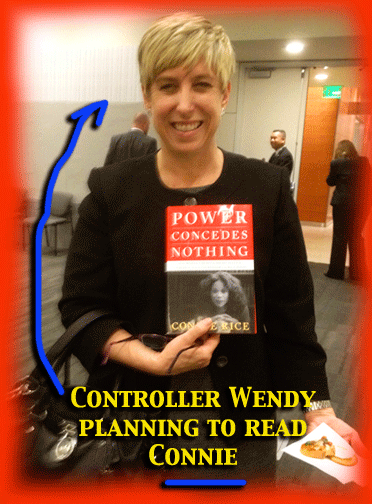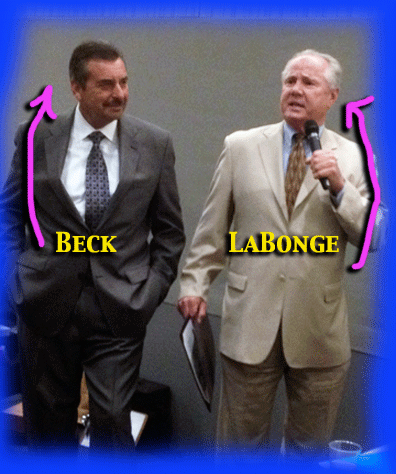http://www.youtube.com/watch?v=eAT51n_w0l4&feature=plcp&context=C3a77c39UDOEgsToPDskLpIbIm0SVoec9x4iUY92VN
It wasn’t your usual book party.
For one thing, Monday night’s book launching event for civil rights lawyer Connie Rice’s new memoir, Power Concedes Nothing, was held at the LAPD’s headquarters, in the over-lit Compstat room, no less—i.e. the room where the cops go to hear a rundown on the latest crime statistics and ‘crime mapping.”
Moreover, the party was hosted by LAPD Chief Charlie Beck—who seemed mildly surprised to find himself in the book party hosting business. (Can you think of another instance where LA’s Chief of Police threw a book party? I can’t either. Go, Chief Charlie! Perhaps this could be the start of a new LA event trend: Law enforcement and literature.)
And then, of course, there’s the fact that the book details, among other things, the years that Rice spent suing the Los Angeles Police Department on a regular basis—and usually winning.
Still, Connie’s suing-the-LAPD days are now mostly in the past, and the mood in the Compstat room on Monday night was so upbeat it sometimes bordered on love fest-y. (As you’ll see from the rough snippets of iPhone videos above.)
Those in attendance were a mix of law enforcement and city government types, plus a smattering of criminal justice-leaning authors and journalists—nearly all of whom passed up the red and white wine for glasses of fizzy water. (Helpful party tip: Always drink less than the cops in the room.) U.S. Attorney Andre Birotte, showed up, as did City Controller Wendy Greuel, and LAPD command staff types like Deputy Chief Pat Gannon of South Bureau, and department spokesperson, Commander Andrew Smith (who was the LAPD guy you saw most often on TV throughout the whole LAPD/Occupy thingy.)
Journalist/authors Joe Domanick, Jesse Katz, and Jon Weiner, made appearances, as did Christine Pelisek from the Daily Beast, KPCC’s Frank Stoltz, KCET’s Judy Muller, the LA Times’ Pat Morrison, Sue Horton, Susan Brenneman and Deborah Vankin.
Among the others who stood around book-buying, appetizer-munching and gossiping were Police Commission head, John Mack, LA Gang Czar Guillermo Cespedes, Gerry Chaleff, who used to administer the federal consent decree for the LAPD but now has been appointed by Chief Beck as the Special Assistant for Constitutional Policing—meaning he’s supposed to be the guy tasked with making sure that LAPD officers don’t go around violating anybody’s Constitutional rights, and community activists, like Alfred Lomas, of LA Gang Tours.
City Councilman Tom LaBonge offered the night’s weirdest compliment to Rice, when in a moment of unchecked effusiveness after presenting her with an honorific city proclamation, he leaned into a microphone and told her, “You remind me of William Mulholland!”
(In case you’ve forgotten, Mulholland was the ultra powerful 1920’s era head of the Department of Water and Power on whom the John Huston-played villain of the movie Chinatown, Noah Cross Hollis Mulwray, was supposed to have been, in part, based.*) After Police Commission head John Mack began looking meaningfully at the City Councilman, and making subtle “cut it” motions, LaBonge tried to clarify things by shouting, “Forget Chinatown! Everybody drinks water.” Or something to that effect. Then he wisely divested himself of the microphone.
Still, everyone seemed to take LaBonge’s outburst as a quirky representation of the pleasant ebullience that characterized the night.
The cheery mood may have, in some ways, had to do with the fact that, unlike many book parties, where the point is to support (or meet) the writer, on Monday night, in addition to coming to support Connie, most everyone seemed to be really anxious to read Rice’s book—if they hadn’t already.
It is, as the subtitle says, “one woman’s quest for social justice in America….”—meaning it is a personal account, told through the lens of Rice’s specific experience and perceptions. Yet, much of it is also a book about certain events in Los Angeles in the last few years that many of those in the room felt they had, in some way had a part, or at the very least lived through and cared very much about—things like the battle to transform the LAPD and the struggle to get a handle on the gang violence that was corroding the emotional health of many LA neighborhoods.
In other words, they—we—think and hope that Connie’s book will add a new valuable puzzle piece to the communal puzzle that is the unfolding history of Los Angeles—a history that all of us get to claim.
PS: I’ve not yet read Connie’s book (as I just got it Monday night) but, like the rest, I’m looking forward to doing so. I’ll report back to you here when I do.
NOTE: I’LL HAVE MUCH NEWSIER NEWS TOMORROW, AND THEN A NEW JAILS/LASD STORY LATE IN THE WEEK.
NOTE 2: I hopelessly bollixed up the Chinatown characters when I first posted this. According to the zillion essays analyzing Robert Towne’s amazing script, Huston’s character Noah Cross plus Cross’s business partner in the film, Hollis Mulwray, collectively represented William Mulholland. (And many of us have eyed the DWP with suspicion ever since.)



City Councilman Tom LaBonge offered the night’s weirdest compliment to Rice, when in a moment of unchecked effusiveness after presenting her with an honorific city proclamation, he leaned into a microphone and told her, “You remind me of William Mulholland!”
He was probably just having a senior moment.
Holis Mulwray wasn’t the character played by Houston. That character was Noah Cross. But neither of them was like the real Mulholland. Bad call. Really bad.
Oh, you’re so right, J.A. How could I switch those two??? (The perils of writing a post after 2 a.m.) Thanks for the correction. I fixed it in the story—admitting my earlier brain freeze, of course.